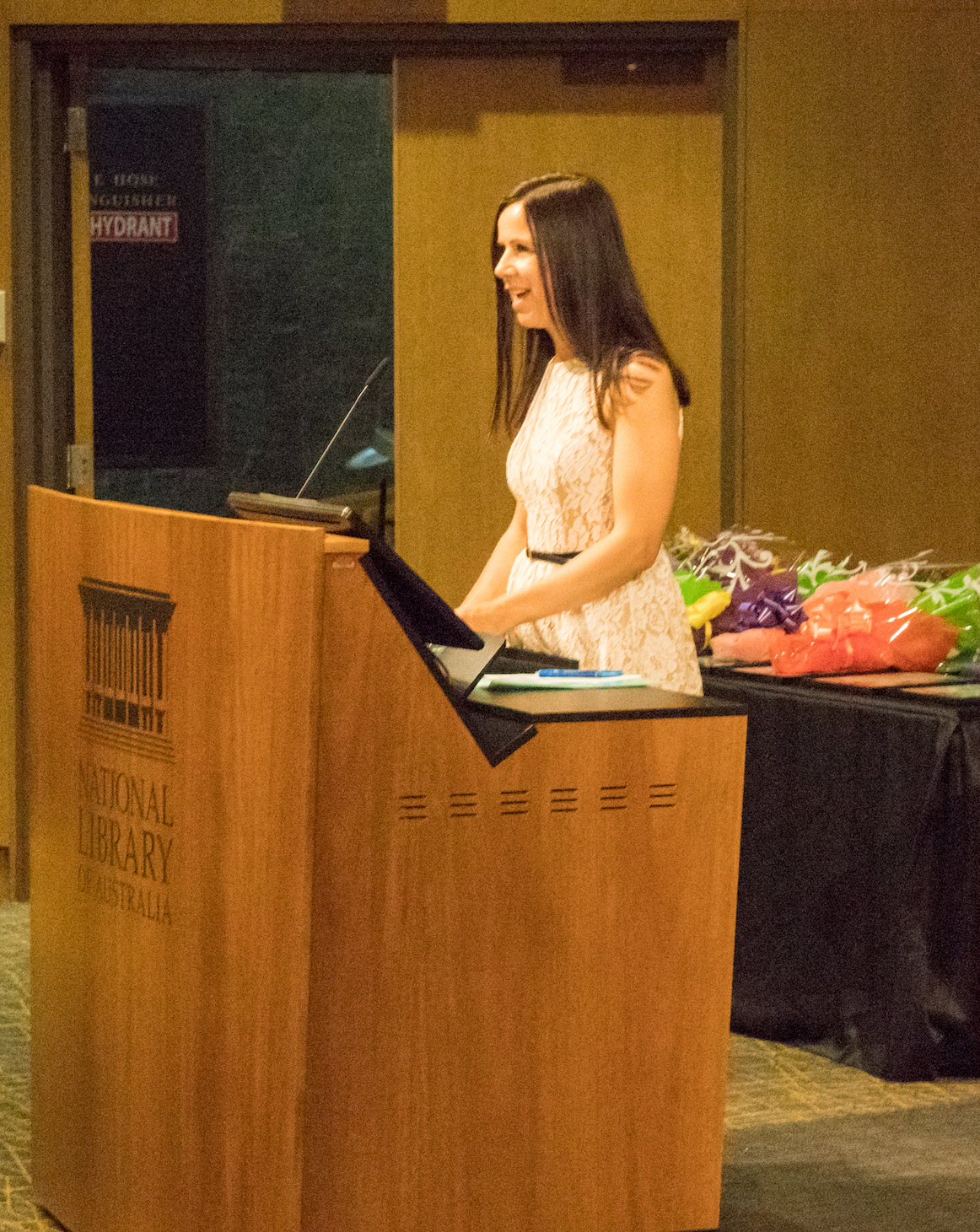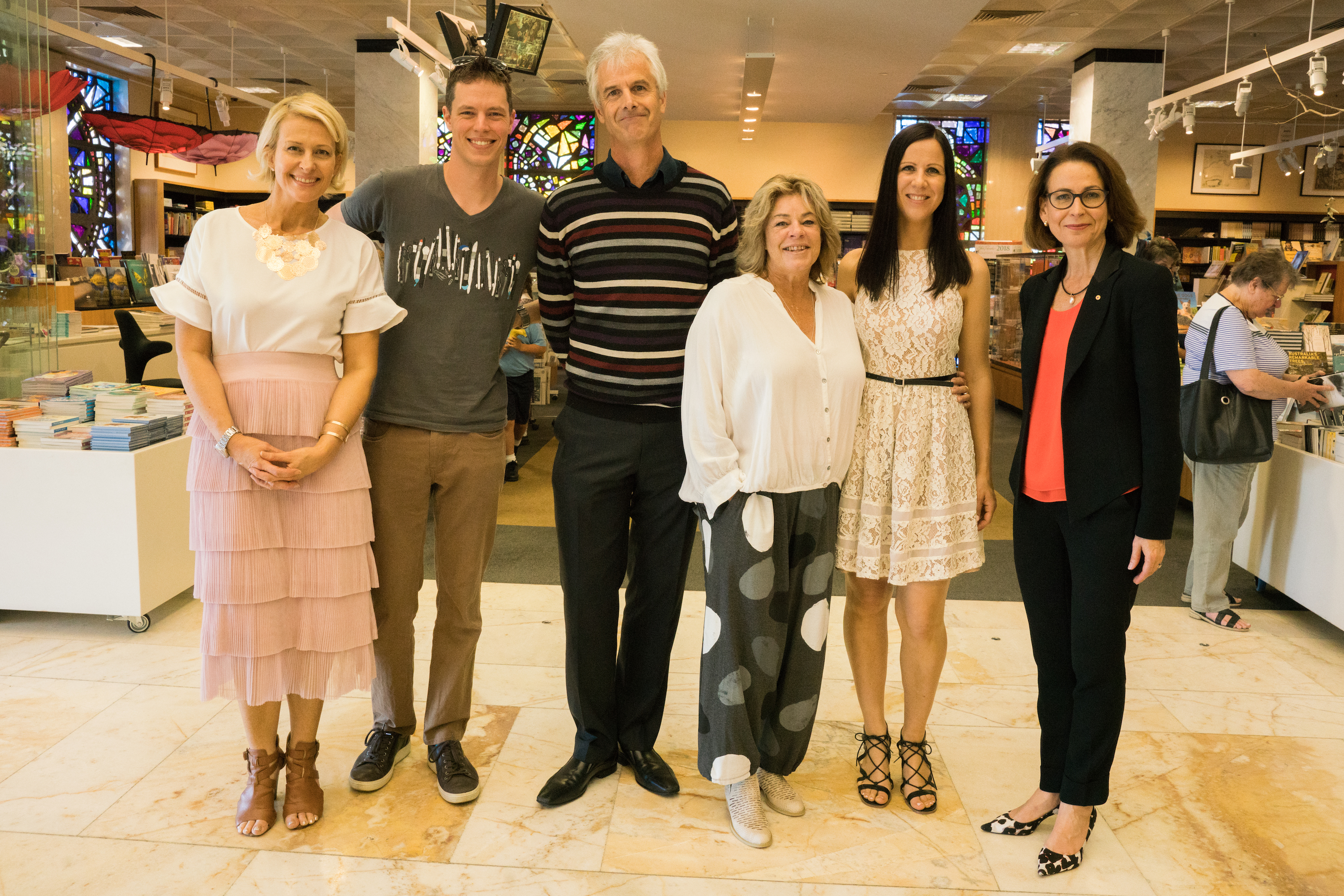2017 is the thirteenth year of the ACT Chief Minister’s Reading Challenge, but it’s been anything but unlucky. This year saw more students than ever before take part, with 34,000 kids from 91 schools reading their 15 books. Twenty-six schools finished with a 100 per cent completion rate across the school — bravo! And 49 schools with the highest percentage of students completing the Challenge were invited to attend the awards ceremony.
 The ceremony is always a wonderful celebration, and this year I was honoured to speak on behalf of the Ambassadors. Our job is to promote reading (could their be a more perfect role?) and visit schools. I was asked to talk about how I became an author, and so I shared how I began writing and making my own books when I was just a wee thing. I remember hours spent on my bedroom floor, writing fairy stories and researching books on hard-hitting topics like the royal family. But I never imagined that I could actually become an author.
The ceremony is always a wonderful celebration, and this year I was honoured to speak on behalf of the Ambassadors. Our job is to promote reading (could their be a more perfect role?) and visit schools. I was asked to talk about how I became an author, and so I shared how I began writing and making my own books when I was just a wee thing. I remember hours spent on my bedroom floor, writing fairy stories and researching books on hard-hitting topics like the royal family. But I never imagined that I could actually become an author.
I spent my childhood in England and I assumed that authors must be terribly posh people who wore tweed suits and spectacles, and lived in mansions where they wrote in cavernous personal libraries that required a ladder to reach the books at the very top. They definitely weren’t people like me who lived in the suburbs in a noisy, chaotic house with five annoying younger brothers and a dog who liked to eat socks.
Unbeknownst to me I was living just ten minutes down the road from a real author, one of the world’s most famous writers and one of my personal favourites, Roald Dahl. His writing studio was nothing like my glamorous fantasy. He wrote in a tiny, cluttered hut in his garden where he rested his feet on a battered suitcase filled with logs, and wore a sleeping bag to keep warm. The hut often had goat droppings in the corners, and there were always plenty of spiders to keep Roald company (which he apparently loved). If I could only have stood on tiptoe and looked in on this scene I might have realised sooner that authors are just ordinary people who love books.
But as it was it took me a long time to figure this out. I wasn’t much helped by my high school careers counsellor who declared that journalism was the only profession for a person like me, but I’d already been turned off that vocation by a school visit from a terribly grumpy newspaper columnist who clearly hated her job. These days I tell students that there is an endless list of possibilities for people who love books, everything from editing and illustrating to design and publicity.
 I finished my speech by setting the students a challenge to read as widely as they possibly can — to explore characters who are completely different to them, who are experiencing different problems. I am a big believer that books are powerful agents of change. They have the potential to connect our diverse global community and create empathy for those who come from different countries, races, religions, cultures and ways of living. They allow us to put ourselves in someone else’s shoes and understand what the world looks like from their perspective, and that is sorely needed in our current climate. So I would encourage you to take up the challenge too, no matter your age!
I finished my speech by setting the students a challenge to read as widely as they possibly can — to explore characters who are completely different to them, who are experiencing different problems. I am a big believer that books are powerful agents of change. They have the potential to connect our diverse global community and create empathy for those who come from different countries, races, religions, cultures and ways of living. They allow us to put ourselves in someone else’s shoes and understand what the world looks like from their perspective, and that is sorely needed in our current climate. So I would encourage you to take up the challenge too, no matter your age!

It’s so heartening that through the Challenge the ACT Government supports and encourages children to explore the pleasures of books. Readers are clever, creative and compassionate thinkers, but the act of reading itself is a pure kind of joy. At least it is for me, and this is what I hope to share with the students as I go into their schools.
The minister quoted some of my favourite Dr Seuss lines in her speech and it seems an apt note to finish on:
The more that you read, the more things you will know. The more that you learn, the more places you’ll go.


Great speech, Irma. Your comment about being told the only ‘career’ for a writer is journalism is so interesting — the same thing happened to me. No one ever suggested I might try writing a book or a collection of poetry, or investigate the publishing world, even the teachers who were very supportive of my writing. While I sometimes wonder about the need for writers to have a public profile (festivals, events, talks, etc), I can see that it does give kids a chance to understand, as you say, that writers are ordinary people, and writing (of all kinds) is something they could aim for.
So interesting that you had the same experience, Robyn. I’ve heard several other writers say this too. Hopefully it was limited to our generation, and careers counsellors are more informed about the possibilities in publishing these days, not just for writers. But the Internet must have opened things up too. Students no longer need to rely on careers counsellors for direction!